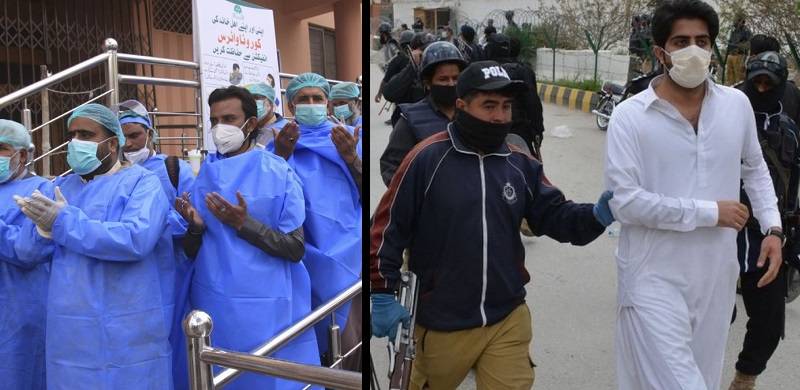
The Coronavirus outbreak has been particularly dangerous to healthcare workers – and this has been observed since the very beginning of the global health crisis, in Wuhan, China. Healthcare professionals, including but not limited to doctors, are a society's first point of contact with the virus. Even in situations where an outbreak is well under control and the public is generally safe, doctors remain susceptible to infection since their work takes them into close proximity with those suffering from this alarmingly contagious pathogen.
In Pakistan, doctors and other healthcare professionals have paid a particularly high price – not just due to the contagiousness of the Coronavirus, but also the policy choices of the government. At the start of this month, the tragic tally of healthcare workers lost to the virus stood at 24, while upwards of 2,200 were infected. It has only risen in the first few days of June.
Doctors have been protesting their abandonment by authorities since the very beginning of Pakistan's struggle against the Coronavirus outbreak. The government response ran the full spectrum from indifference to outright hostility. Some demonstrations of doctors were dispersed with force. Others were threatened with loss of employment. Aspersions and insinations were made about the pro-opposition “political” agenda of yet others. And most were simply ignored.
There are two fundamental ways in which the healthcare professional community feels let down by authorities. First, by being deprived of the necessary personal protective equipment (PPEs) – a complaint that has been too widespread to be ignored. Second, by being left to face the brunt of the influx of Covid-19 patients while the government adopts a policy of laissez-faire “herd immunity”, which is breathtaking in its disregard for public safety.
As if this were not enough disservice to doctors and other healthcare professionals, figures from the federal government and some prominent religious personalities have systematically spread falsehoods about the Coronavirus. These have ranged from outright denial-ism to outlandish conspiracy theories. The motive of such mis- and disinformation has obviously been to shield authorities from responsibility for the situation. And the cost has been paid by a misguided public in the form of wildly rising infections.
Ever willing to turn its anger on the vulnerable, the public has on occasions lashed out physically at doctors. Families of Covid-19 victims have resorted to violence against doctors, having been made to believe the very worst about the role of these vital personnel.
As Pakistan's feeble, underfunded and under-prioritized healthcare system begins to buckle under the stress of a fiercely contagious pandemic, it is feared that doctors will be forced to make unenviable decisions about which patients get treatment and which simply cannot be tended to for lack of ventilators, hospital space and personnel. It is likely that a deliberately misguided public will direct yet more of its sadness and wrath at the only group of people who have actually tried to help during the pandemic: i.e. healthcare professionals.
In Pakistan, doctors and other healthcare professionals have paid a particularly high price – not just due to the contagiousness of the Coronavirus, but also the policy choices of the government. At the start of this month, the tragic tally of healthcare workers lost to the virus stood at 24, while upwards of 2,200 were infected. It has only risen in the first few days of June.
Doctors have been protesting their abandonment by authorities since the very beginning of Pakistan's struggle against the Coronavirus outbreak. The government response ran the full spectrum from indifference to outright hostility. Some demonstrations of doctors were dispersed with force. Others were threatened with loss of employment. Aspersions and insinations were made about the pro-opposition “political” agenda of yet others. And most were simply ignored.
There are two fundamental ways in which the healthcare professional community feels let down by authorities. First, by being deprived of the necessary personal protective equipment (PPEs) – a complaint that has been too widespread to be ignored. Second, by being left to face the brunt of the influx of Covid-19 patients while the government adopts a policy of laissez-faire “herd immunity”, which is breathtaking in its disregard for public safety.
As if this were not enough disservice to doctors and other healthcare professionals, figures from the federal government and some prominent religious personalities have systematically spread falsehoods about the Coronavirus. These have ranged from outright denial-ism to outlandish conspiracy theories. The motive of such mis- and disinformation has obviously been to shield authorities from responsibility for the situation. And the cost has been paid by a misguided public in the form of wildly rising infections.
Ever willing to turn its anger on the vulnerable, the public has on occasions lashed out physically at doctors. Families of Covid-19 victims have resorted to violence against doctors, having been made to believe the very worst about the role of these vital personnel.
As Pakistan's feeble, underfunded and under-prioritized healthcare system begins to buckle under the stress of a fiercely contagious pandemic, it is feared that doctors will be forced to make unenviable decisions about which patients get treatment and which simply cannot be tended to for lack of ventilators, hospital space and personnel. It is likely that a deliberately misguided public will direct yet more of its sadness and wrath at the only group of people who have actually tried to help during the pandemic: i.e. healthcare professionals.
